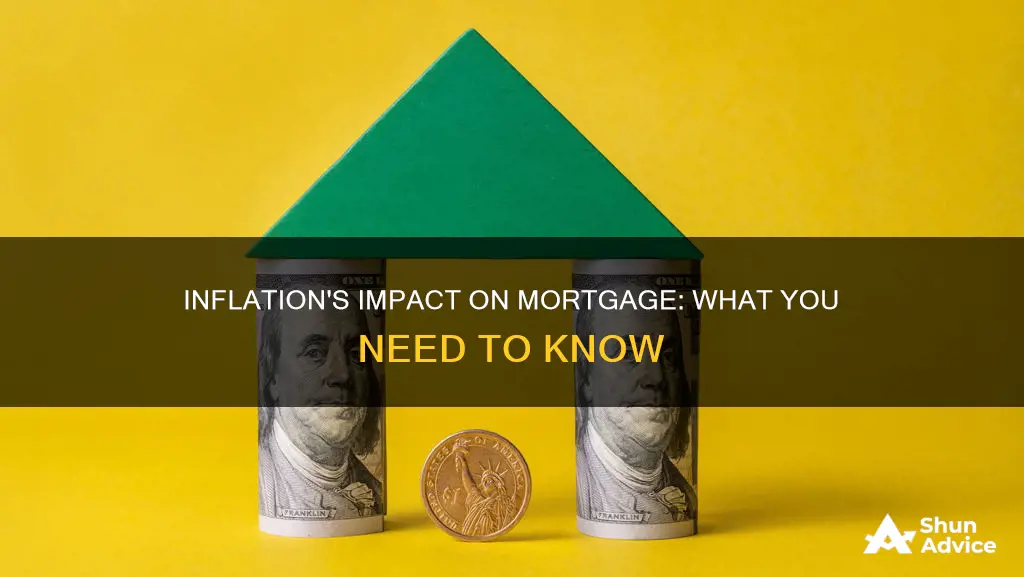
Inflation impacts mortgages in several ways. Firstly, it can increase interest rates on new mortgages and adjustable-rate mortgages (ARMs). This is because inflation devalues the currency, reducing its purchasing power. Secondly, inflation can increase housing prices as the costs of materials and labour rise. Thirdly, inflation can affect the demand for homes, potentially reducing competition in the housing market. Additionally, inflation can impact the various closing costs and third-party services associated with purchasing a home, such as inspections and appraisals. While inflation doesn't directly influence mortgage interest rates, it is linked to them, and understanding this relationship can help borrowers make informed decisions.
How Inflation Impacts Mortgage:
| Characteristics | Values |
|---|---|
| Interest rates | Inflation leads to higher interest rates on mortgages as it devalues the currency. |
| Housing prices | Inflation can increase housing prices due to the rising costs of materials and labour. |
| Demand for homes | Inflation can reduce demand for homes, making the housing market less competitive. |
| Monthly payments | Inflation can cause monthly mortgage payments to increase, impacting household budgets. |
| Borrowing costs | Inflation increases borrowing costs, making debts more expensive to repay. |
| Credit availability | Inflation may lead to a decrease in credit availability as lenders tighten their affordability tests. |
| Fixed-rate mortgages | Inflation's impact on interest rates may encourage homeowners to opt for fixed-rate mortgages to stabilise payments. |
| Outstanding loans | Inflation reduces the value of outstanding loans, benefiting borrowers by making repayments easier. |
| Purchasing power | Inflation decreases the purchasing power of money, affecting the affordability of mortgages. |
| Federal policies | Inflation influences the policies of central banks, such as the Federal Reserve, which adjust interest rates to curb inflation. |
What You'll Learn

Inflation increases interest rates on mortgages
Inflation can have a significant impact on mortgages, and it is essential to understand how these two are related. Inflation is the general rise in goods and services costs over time, which leads to a fall in the purchasing power of money. While inflation does not directly affect mortgage interest rates, it can cause them to increase.
When inflation increases, interest rates on new mortgages tend to rise as well. This is because inflation devalues the currency, reducing its purchasing power. For example, if inflation is at 10%, a £200,000 mortgage's value will be reduced by approximately £20,000 in real terms. Thus, the lender will need to increase the interest rate on the mortgage to compensate for this loss in value.
The Federal Reserve in the US and the Bank of England in the UK are responsible for adjusting the federal funds rate and the base rate, respectively, in response to economic changes. These changes can influence mortgage lenders to adjust their interest rates. For instance, during the early days of the COVID-19 pandemic, shutdowns disrupted the supply of goods and services, causing supply-side inflation. In response, the Federal Reserve printed vast sums of money to lend to borrowers, which may lead to very high inflation.
Inflation can also impact the housing market by increasing the demand for credit and sending housing prices upward. As the prices of goods and services rise, so do the costs of materials and labour for building and selling homes. This can make buying a house more expensive. Additionally, inflation can affect the monthly payments of existing homeowners with variable-rate mortgages.
Overall, while inflation does not directly impact mortgage interest rates, it plays a crucial role in the economy and can cause indirect increases in mortgage rates.
Wells Fargo Mortgage Agent: Money-Making Strategies
You may want to see also

Inflation can reduce the value of outstanding mortgage debt
Inflation can have a significant impact on mortgages, and it is essential to understand how it affects mortgage rates to make informed borrowing decisions. While inflation does not directly impact mortgage interest rates, it is indirectly responsible for the rise in these rates. This is because inflation leads to a devaluation of the dollar, reducing its purchasing power. As a result, the value of outstanding mortgage debt is also directly reduced by inflation.
For example, consider a £200,000 mortgage with a 10% inflation rate. In this case, the value of the mortgage debt will decrease by approximately £20,000 in the first year and by £12,000 in the second year if the inflation rate averages around 6%. Thus, over the two-year period, the real value of the mortgage debt will be £168,000, a significant reduction from the original £200,000. This reduction in the value of outstanding mortgage debt can be beneficial for borrowers, as it allows them to repay their debts with money that has lost value over time.
Additionally, inflation speeds up the rate at which the mortgage is repaid in real terms. For instance, let's consider a £200,000 mortgage with a zero-interest rate repaid at £5,000 per year over 40 years. In a scenario with zero inflation, the outstanding value of the mortgage would decrease in a straight line by £5,000 each year. However, with inflation, the outstanding value of the mortgage decreases more rapidly in real terms, resulting in faster repayment progress.
It is worth noting that while inflation can reduce the value of outstanding mortgage debt, it also leads to higher interest rates on new mortgages and adjustable-rate mortgages (ARMs). This is because lenders need to compensate for the declining value of the loan due to inflation. As a result, homeowners with adjustable-rate mortgages may experience an increase in their monthly payments. Therefore, it is generally recommended that homeowners opt for fixed-rate mortgages during periods of high inflation to avoid the direct impact of rising interest rates.
Moreover, inflation can also drive up housing prices as the costs of materials and labour increase. This can make buying a house more expensive, especially when coupled with rising interest rates and a low supply of homes for sale. Therefore, while inflation can reduce the value of outstanding mortgage debt, it can also make the housing market more challenging for prospective buyers.
Better Mortgage: Closing Disclosures Simplified
You may want to see also

Inflation can increase housing prices
Inflation can have a significant impact on mortgage rates and the housing market. While it does not directly affect mortgage interest rates, inflation causes the value of money to decrease, leading to a reduction in consumers' purchasing power. As a result, people need to spend more money to buy the same goods and services. This includes the cost of materials and labour used in building and selling homes, which leads to higher housing prices.
The relationship between inflation and housing prices is complex and influenced by various factors. Firstly, inflation can increase the cost of construction materials, making it more expensive to build new homes. This, in turn, can lead to a reduction in the supply of available homes on the market as homeowners may postpone selling their properties due to the higher costs of purchasing a new one. With a limited housing supply and increasing construction costs, homebuilders and sellers may increase their asking prices.
Secondly, inflation can impact the demand for housing. As inflation erodes purchasing power, potential homebuyers may delay their plans to buy a home, leading to a decrease in demand. This reduced demand can put pressure on sellers, who may be forced to lower their asking prices to attract buyers. However, if the demand remains high despite decreasing purchasing power, it can further drive up housing prices.
It is important to note that the impact of inflation on housing prices is not always linear and can vary across different regions. While inflation typically leads to higher housing prices, other factors, such as supply and demand dynamics, zoning regulations, and income growth, also play a significant role in influencing housing costs.
In summary, inflation can increase housing prices by raising construction costs, affecting supply and demand, and eroding the purchasing power of consumers. However, the relationship between inflation and housing prices is complex and subject to various economic factors and regional variations.
Mortgage Paperwork: What to Expect and How to Prepare
You may want to see also

Inflation can increase the demand for credit
Inflation can have a significant impact on mortgages, affecting both homeowners and those looking to buy. While inflation does not directly influence mortgage interest rates, it is linked to them, and understanding this relationship can help borrowers make better decisions.
The impact of inflation is far-reaching, and it can affect everyone. Inflation occurs when there is a general increase in the price of goods and services, causing a fall in the purchasing power of money. This can be caused by a slowdown in the supply of goods and services, as seen during the COVID-19 pandemic, when shutdowns and stay-at-home orders disrupted production and shipping.
In addition to increasing the demand for credit, inflation can also send housing prices upward. As the prices of goods and services rise, so do the costs of materials and labour for building and selling homes, resulting in higher home prices for consumers. This can make buying a house even more expensive, especially when combined with rising interest rates and a low supply of homes for sale.
To prepare for the impact of inflation, homeowners can pay off credit card debt and opt for a fixed-rate mortgage rather than an adjustable-rate mortgage. While a fixed-rate mortgage may not immediately reflect changes in the inflation rate, it can provide more stability and predictability for homeowners.
Deed of Trust vs Mortgage: What's the Difference?
You may want to see also

Inflation can reduce demand in the housing market
Inflation can have a significant impact on the housing market, and it can cause a reduction in demand for several reasons. Firstly, as inflation drives up interest rates, the cost of taking out a mortgage becomes more expensive. This can make buyers hesitant to enter the market, as the overall cost of buying a home increases. With higher interest rates, monthly mortgage payments increase, which can make buyers reconsider their ability to afford a home. This is especially true when price rises outpace wage increases, putting pressure on household budgets.
Secondly, inflation reduces consumers' purchasing power. With their money not stretching as far, potential homebuyers may choose to wait out the market, hoping for prices to fall or their incomes to increase. This reduction in demand can cause sellers to lower their asking prices, as they may be forced to compete for the reduced number of buyers.
Thirdly, inflation can reduce the supply of homes on the market. Construction materials become more expensive during inflation, and homeowners may delay selling their properties as purchasing a new home becomes more costly. This can further discourage buyers, as the reduced supply may result in increased prices.
While it is difficult to predict the future of the housing market, it is clear that inflation can play a significant role in reducing demand. Buyers may be priced out of the market, and sellers may struggle to find buyers at their desired asking prices. However, it is important to remember that the impact of inflation on the housing market is complex and influenced by various factors, including regional differences and individual economic circumstances.
Closing Costs: Rolling Them into Your Mortgage
You may want to see also
Frequently asked questions
Inflation can cause mortgage rates to increase. This happens because inflation devalues the US dollar, reducing its purchasing power.
Inflation can cause housing prices to increase. This is because the costs of materials and labour to build and sell homes rise, which leads to higher prices for consumers.
Inflation can reduce demand for homes, making the market less competitive. This can make it easier for buyers to purchase a home without getting into a bidding war or haggling with the seller.
If you have a fixed-rate mortgage, your monthly payments will not change when the inflation rate rises until the end of your fixed term. However, when your fixed term expires, you may be moved onto a variable rate that is influenced by market changes.
Inflation can benefit borrowers by allowing them to repay debts with money that has depreciated in value. However, it can also benefit lenders by increasing demand for credit and raising interest rates.







